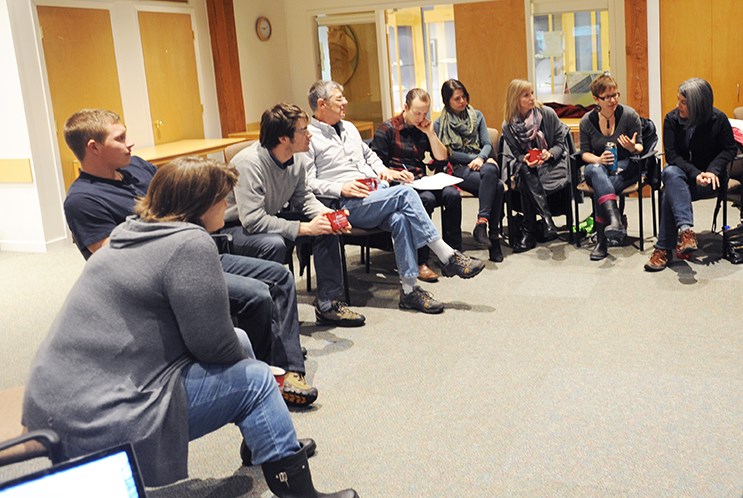Is housing affordable in Squamish?
“No” was clearly the answer at a mayor’s community discussion on housing held Friday, when about 20 people gathered at the Squamish Public Library to discuss affordability of homes as the community grows rapidly.
“We have pretty much given up on the dream of even owing a place in the next little while,” said Keely Kidner, who juggles three part-time jobs in Squamish. She and her husband recently moved to Squamish from New Zealand.
Maureen Mackell, executive director of Squamish Helping Hands Society, said the cost of living is now so high, even people with jobs are now sleeping in the homeless shelter. As housing prices surged, so have rental prices.
Naomi Dunaway moved here from Pemberton three years ago and is again hunting for a place to live. “My housing situation has fallen through,” Dunaway said, “so I find it extremely scary, even though I have a good job.”
She works at the employment centre. As a single person, she’s changing her goal of owning a place, now hoping instead to buy a trailer as her home and find a spot where she can live in it.
The concerns about housing prices were also echoed by public services librarian Chelsea Jordan-Makely, whose husband works at Quest University. Though she and her husband are educated professionals, when she looks at house prices, she asks, “How the heck could this ever happen?”
As a librarian, she often tries to help other new residents seeking information on living in Squamish. She pointed out the library is buying more books about tiny houses.
Meg Reynolds, executive director of the Howe Sound Women’s Centre, is concerned that women who have suffered abuse and their children cannot find affordable rentals.
With the rapid growth in Squamish, affordable housing is critical, said community volunteer Chris Pettingill. “All of a sudden it’s our biggest problem.”
Mayor Patricia Heintzman called the housing crunch “a product of our success” but a challenging problem.
The district has been working on several initiatives to create affordable housing, including this month passing a bylaw that relaxes the rules for secondary suites – rental units within houses. While the suites must be on the main floor for parts of Squamish on the flood plain, they can now be up to 70 or 90 square metres (750 to 960 square feet), depending on property size, and they no longer have to be in houses connected to municipal water services, said Jonas Velaniskis, development services director.
About 4,000 new housing units have been approved by council over the past 10 years, including the Oceanfront development, Velaniskis said, and others are in the approval process. For each new development, builders are being asked to either create affordable housing as part of the project or contribute funds to the district.
“Many prefer to contribute cash,” he noted.
Creating jobs will also help relieve pressure, Heintzman said. About 2,600 jobs are expected to be created on the Oceanfront, not including construction jobs, she said.
She also said the district will have an opportunity to create more affordable housing when it redevelops the block that includes municipal hall. That could happen in the near future, as “city hall is a leaky mess, an unhealthy building,” she said.
Developer Doug Day, who admitted most of his housing projects “tended to be high-end,” said he’s interested in creating affordable housing. “The only way to get this done is through the rezoning process,” he said. The rising Vancouver house prices will continue to fuel demand for Squamish, he noted, but if land were provided free, developers could build rental apartment buildings by borrowing through a program at rates as low as 1.7 per cent.
Pettingill questioned the need to create “manicured parks and hockey rinks” that will drive up taxes – making housing even less affordable – and instead encourage people to enjoy recreation by hiking or rock climbing.
Commercial space is also an issue, said Councillor Susan Chapelle, who owns a business downtown. Finding affordable property to lease has been a struggle, she said.
Currently, she and her family are in the process of moving into a tiny home built in her back yard, not what she would have expected when she came to Squamish 18 years ago from Toronto. “I was shocked at how affordable it was,” she said, adding that much has changed since then.
Reynolds is worried prices will continue to rise. “We need to be mindful of speculative housing,” she said. “I think it is driving up the cost of living and affordability.”



